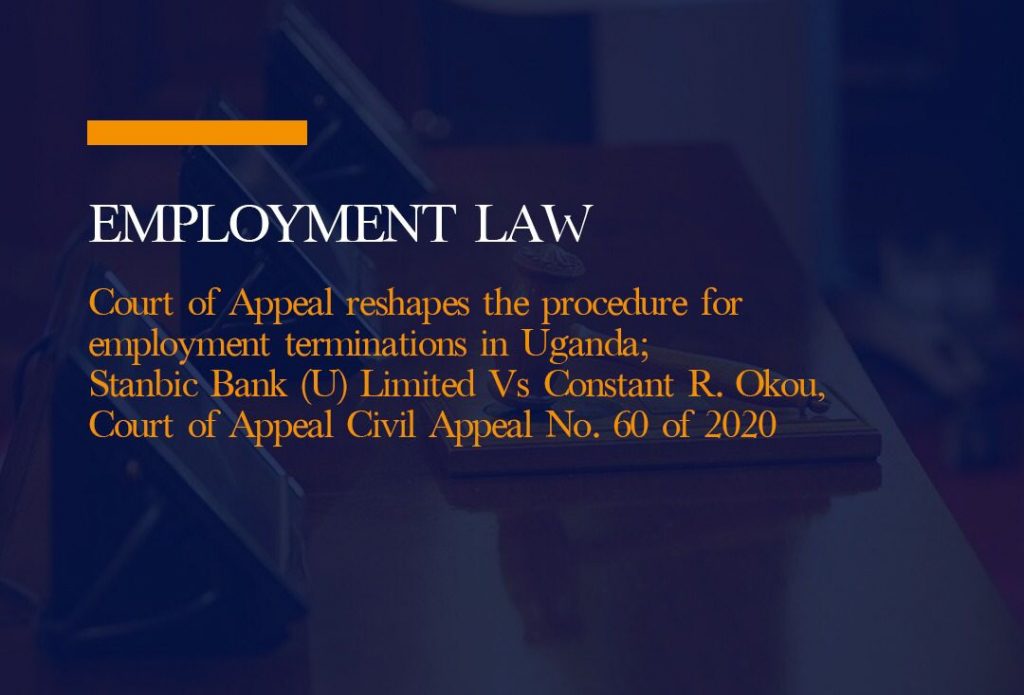Court of Appeal reshapes the procedure for employer & employee terminations in Uganda; Stanbic Bank (U) Limited Vs Constant R. Okou, Court of Appeal Civil Appeal No. 60 of 2020
Summary
On the 17th March 2023, the Court of Appeal delivered a unanimous Judgment that affects the manner and procedure for the termination of employment contracts in Uganda in the case of Stanbic Bank (U) Limited versus Constant R. Okou.
The Judgment of the Court was in respect of an appeal that had been lodged by Stanbic Bank against the Judgment of the Industrial Court. The Court of Appeal held that the Termination of the employee through the payment in lieu of notice but without issuing the requisite notice under the Employment Act rendered the termination wrongful as it was in breach of a mandatory statutory requirement to issue notice.
The factual history of the dispute
The Respondent was employed by Stanbic Bank (U) Limited until 9th November 2013, when Stanbic Bank issued him with a termination letter but without notice as it took effect immediately. He was paid a salary up to the last day of work, three months’ salary in lieu of notice according to the contract of employment, encashment of the outstanding leave days and this Provident pension payment.
The Respondent filed a case in the Industrial Court alleging that the termination of his employment was unlawful and this was because he was never subjected to any disciplinary proceedings prior to the termination of his services, no reason was given by the appellant for the termination and he was not afforded a hearing before his employment was terminated. On the other hand, the appellant filed its defense and stated that there was no wrongdoing and the termination was lawful because the employment relationship was brought to an end by termination as opposed to a dismissal. The Industrial Court however found in favor of the respondent and gave Orders against the Appellant.
The appellant was aggrieved by the award of the Industrial Court and appealed to the Court of Appeal on a number of grounds key among them was that; The Learned trial judges and panelists of the Industrial Court erred in law in holding that the termination of the respondent’s employment by the appellant was wrongful and that the Learned trial judges and panelists of the Industrial Court erred in Law in relieving the respondent of this outstanding Loan obligations yet he used and benefited from the money advanced.
Court findings
The Court of Appeal in the exercise of its powers as the first appellate Court reviewed the evidence on record and drew its own conclusions as summarized herein below.
- The Court of Appeal has held that termination of an employment contract without giving the mandatory notice of termination as required under sections 58 (1) & (2) of the Employment Act, renders the termination wrongful and is deemed to amount to summary termination under section 69 of the Employment Act.
- The practice of terminating employees through the payment in lieu of notice as was the position in Barclays Bank of Uganda Vs. Godfrey Mubiru, S.C.C.A 1/1998, has been distinguished as being the position under the repealed Employment Act. Under the current Employment Act unless the employee consents to payment in Lieu of notice, any contract clauses (including any provision in the Human Resources Manual) which provide for payment in Lieu of notice thereby doing away with the mandatory requirement for notice, cannot be enforced without the consent of the employee.
- The Court of Appeal furthermore affirmed the principle that where a loan is secured on the salary earnings of the employee and the employer unlawfully terminates the employment and further makes the employee liable to pay for the loan from other sources not envisaged at the time of the entering into a salary loan agreement, any failure of the employee to service to the loan would be a foreseeable and necessary consequence of the unlawful termination of his or her employment.
- Where termination of employment is unlawful, the employee would be entitled to relief from any loans that were the subject of repayment through salary. However, this is not a general principle and each case has to be considered on the basis of its own facts. The contracts on which loans are based are material consideration in considering whether loans are payable by salary deduction every loan has to be assessed based on its contractual terms and not from inference
Import of Judgment on Employment relations
- Employers need to re-evaluate the structure and effect of loan recommendation letters in relation to the different types of loans employees may seek. In affirming the general position as was originally held by the Industrial Court in Mbiika Vs. Centenary Bank; LDC 023/2014 and UDB Vs. Florence Mufumba, the Court of Appeal has reaffirmed the potential liability employers have if and when they wrongly terminate or dismiss an employee for all loans previously taken out and hinged on repayment through salary deductions. In the bigger scheme of employment relations, some Employers may increasingly become hesitant to issue recommendation letters to employees seeking to obtain salary loans and in the case of some other Employers, stop giving Salary loans to employees. This will of course vary from employer to employer.
- For any employer considering issuing a Termination Notice in strict conformity with sections 58 (1) & (2) of the Employment Act, it is prudent to include an option for the employee in issue to consent to the payment in lieu of notice.
- The requirement to issue a mandatory notice to employees will require that employers review their Human Resources Manuals to provide for the application of Gardening Leave. Gardening leave is a contractual provision that can be triggered when an employee gives or is given a termination notice. It is mainly used by employers to protect the interests of the business and to minimize the escalation of any breakdown in the working relationship between the concerned employee and the employer. During the period of gardening leave, the employee is prohibited from Coming to the work premises; Carrying out any work duties (from home or elsewhere); or Communicating with clients or colleagues. Although no work or attendance is required, the employee remains on the payroll and within the company throughout the entirety of the gardening leave process. That means that both the employer and employee must continue to hold up their contractual obligations, including fidelity and confidentiality. The employer therefore remains responsible for: Keeping the employee on the payroll and paying their normal salary, and providing them with existing contractual benefits such as fuel, insurance, airtime, gym memberships, and any other contractual benefit.
Caveat
The contents of this article are intended to convey general information only and not to provide legal advice or opinions. The contents of this website, and the posting and viewing of the information on this website, should not be construed as, and should not be relied upon for legal advice in any particular circumstance or fact situation. An Advocate/ attorney should be contacted for advice on specific factual legal issues.


